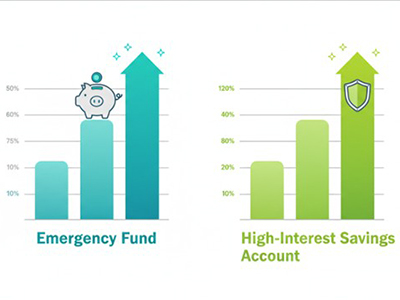If you want more financial stability, you don’t just need “a savings account.” You need the right kind of savings account and a clear plan for how to use it.
That’s where high-interest savings accounts come in. By earning more on the money you’re already setting aside, you can reach your goals faster, handle emergencies with less stress, and build a stronger financial foundation over time.

Below, we’ll break down what high-interest savings accounts are, how they support financial stability, what to look for, and how 1st Community Credit Union can help you put your savings to work.
What Is a High-Interest Savings Account?
A high-interest (or high-yield) savings account is simply a savings account that pays a higher dividend/interest rate than a standard savings account. Over time, that higher rate helps your balance grow faster—especially when you leave the money alone and keep adding to it.
Instead of earning a very small amount of interest each month, a high-interest savings account helps you:
- Grow your emergency fund more quickly
- Hit short-term goals (like vacations or holiday spending) sooner
- Build savings for bigger goals with less out-of-pocket strain
At 1st Community Credit Union, accounts such as the Ultimate Savings and Money Market accounts are designed to offer higher dividend rates when you maintain certain minimum balances, giving you a way to earn more on larger savings balances while still keeping your money accessible.
Why Financial Stability Matters… More Than Just “Having Money”
“Financial stability” doesn’t mean being rich. It means:
- You can cover your basic expenses
- You can handle an unexpected bill without panic
- You’re making steady progress toward future goals
When you have a strong savings cushion, you:
- Sleep better at night
- Don’t have to rely as heavily on credit cards
- Have more control when life changes unexpectedly (job change, car repair, medical bill, etc.)
High-interest savings accounts are one of the simplest tools to support that stability. They don’t require you to understand the stock market or take on big risks. They reward you for doing something you already know you should do: save regularly.
5 Ways High-Interest Savings Accounts Support Financial Stability
1. Your Money Grows Faster Without Extra Effort
The main advantage is simple: a higher rate means more earnings on the same balance. Over months and years, that difference adds up.
If you’re already committed to saving, putting that money into a higher-dividend account is like giving your plan a built-in boost. You’re doing the same work, but getting more results.
2. They’re Ideal for Emergency Funds
Your emergency fund should be:
- Safe
- Easy to access when you truly need it
- Earning something while it sits there
A high-interest savings account checks all three boxes. Your money stays in a federally insured account at a credit union like 1st CCU, you can access it when a real emergency hits, and you’re not leaving it in an account that barely grows.
3. Separate “Buckets” Keep You Organized
Many people find it easier to save when they separate different goals.
For example, you might have:
- A high-interest savings account for your main emergency fund
- A separate savings account for a vacation or big purchase
- A money market account for a larger cushion you don’t plan to touch often
1st CCU offers flexible savings options like You-Name-It Savings, Ultimate Savings, and a Money Market account, so you can organize your goals and keep each one on track without mixing everything together.
4. They Help Protect Short-Term Money from Market Risk
High-interest savings accounts are especially useful for money you’ll need in the next few months or years. That might include:
- Emergency funds
- Property tax savings
- Tuition due in the next year
- A down payment you plan to use soon
You don’t want to risk that money in investments that could go up and down right before you need it. A high-interest savings account lets you earn more than a basic account while keeping your balance stable.
5. They Encourage Consistent Saving Habits
When you can see your balance grow—both from your deposits and the dividends you’re earning—it’s motivating. Many people find that once they start, they want to keep going.
Pair a high-interest savings account with automatic transfers, and you’ve got a simple, low-stress system to keep your savings moving in the right direction month after month.
How to Use a High-Interest Savings Account at Different Life Stages
Getting Started or Rebuilding
If you’re just beginning to save—or rebuilding after a tough season—start with:
- A specific emergency fund goal (for example, $500, then $1,000)
- Automatic transfers from checking into your high-interest savings account
- A small, realistic amount per paycheck (even $25–$50 adds up)
Your first win is simply having something set aside, in an account that actually grows.
Growing Your Financial Foundation
Once you’ve hit your early goals, you can:
- Increase your automatic transfer amount
- Use your high-interest savings account for 1–3 months of expenses
- Add a separate savings account for a specific goal (home repairs, car replacement, etc.)
This is where an account like 1st CCU’s Ultimate Savings can help you earn more on a larger cushion, as long as you maintain the minimum balance.
Planning for Bigger Goals
As life moves forward, you may use high-interest savings accounts to:
- Save for a down payment on a home
- Build a larger emergency fund (3–6 months of expenses)
- Prepare for big, planned expenses (weddings, moves, education costs)
For bigger balances, some members choose a combination of:
- High-interest savings or money market accounts
- Share certificates for money they can truly set aside for a fixed term
The right mix depends on your timeline and how quickly you might need the funds.
What to Look For in a High-Interest Savings Account
Not all savings accounts are the same. When you’re comparing options, pay attention to:
- Dividend/interest rate: Higher is better, but also consider how often it’s paid and whether it’s tiered based on balance.
- Minimum balance requirements: Some accounts require a certain minimum to open or to earn the higher rate (for example, 1st CCU’s Ultimate Savings and Money Market accounts have a $1,000 minimum opening deposit).
- Fees: Look for accounts with low or no monthly fees, or clear ways to avoid them.
- Access: How easy is it to transfer money in and out using online or mobile banking?
- Safety: Make sure deposits are federally insured (1st Community Credit Union deposits are federally insured by the NCUA, up to applicable limits).
A high-interest rate is great, but only if the account also fits your real-life needs and habits.
How 1st Community Credit Union Can Help You Build Stability
1st Community Credit Union is focused on helping members reach their goals—not just selling products. When it comes to building financial stability, here’s how 1st CCU can support you:
- Multiple savings options: Primary Savings, You-Name-It Savings, Ultimate Savings, Money Market accounts, Christmas Club, IRAs, and share certificates give you flexibility for both short-term and long-term goals.
- Competitive dividend rates: Higher rates on accounts like Ultimate Savings and Money Market mean your savings can work harder while staying accessible.
- Easy-to-use digital tools: Online and mobile banking make it simple to check balances, move money between accounts, and stay on top of your goals.
- Local, personalized support: If you’re not sure which savings option fits your situation, you can talk with a 1st CCU team member who understands both the products and the local community.
You don’t have to have everything “figured out” to start. You just need a clear first step and a partner that’s on your side.
Simple Steps to Get Started
If you’re ready to use high-interest savings accounts to build financial stability, here’s a straightforward plan:
1. Choose your main goal.
- Emergency fund?
- Bigger cushion?
- Saving for a specific expense?
2. Pick the account that fits.
- Standard savings for smaller starting balances
- High-interest option like Ultimate Savings or a Money Market account once you’re able to maintain the minimum balance
- Consider share certificates for money you can lock up for a set period
3. Automate your savings.
- Set up a recurring transfer from checking to savings each payday
- Treat it like a bill you pay yourself
4. Review and adjust a few times a year.
- Increase your transfer amount when your budget allows
- Add new goals or accounts as your life changes
5. Reach out to 1st Community Credit Union with questions.
- Visit a branch, call, or explore the website to compare accounts and learn more about current rates and options
Financial stability doesn’t happen overnight, but every dollar you move into a high-interest savings account is a step in the right direction. With the right account and consistent habits, your savings can grow faster—and your future can feel a lot more secure.
Choosing the right financial account can feel like a big decision, but it doesn’t have to be overwhelming. At 1st Community Credit Union, we believe banking should work for you—helping you save more, stress less and manage your money with ease. Whether you’re opening your first account or looking for another option, focusing on the important features can make all the difference.

Below are five essentials to look for in an account, along with actionable tips to evaluate your options like a pro.
1. Low Fees: Keep More of Your Hard-Earned Money
Let’s face it—nobody likes seeing their money chipped away by unnecessary fees. Low fees are a top priority when choosing an account, because they directly impact how much you keep in your pocket. Monthly maintenance fees, ATM charges, overdraft penalties and transaction costs can add up fast if you’re not careful. At 1st Community Credit Union, we’re proud to offer accounts designed with affordability in mind, so you can focus on your financial goals instead of dodging hidden costs.
How to Evaluate: Check the credit union or bank’s fee schedule, which is usually found on their website or by asking a representative. Look for accounts with no monthly maintenance fees or easy ways to waive them, like maintaining a minimum balance. Compare ATM policies, too. Does the bank offer free access to a wide network or reimburse out-of-network fees? A little research can go a long way.
2. High-Interest Rates: Make Your Money Grow
Why settle for an account that just holds your money when it could be earning for you? High-interest rates are a game-changer, especially for savings accounts or interest-bearing checking accounts. Even a small boost in your rate can compound over time, turning idle cash into a growing asset. At 1st CCU, we’re committed to helping our members maximize their savings with competitive rates that beat many big banks.
How to Evaluate: Compare annual percentage yields (APYs) across financial institutions—don’t just look at the base rate. APYs reflect how much you’ll earn with compounding. Ask if the rate is promotional (temporary) or standard, and check for balance requirements to qualify. Online tools like rate comparison sites can help, but calling the financial institution directly ensures you get the latest info. Aim for an account that rewards you for saving more.
3. Mobile Banking Capabilities: Convenience at Your Fingertips
In today’s fast-paced world, mobile banking isn’t just a perk, it’s a must. A robust mobile app lets you check balances, deposit checks, pay bills and transfer funds anytime, anywhere. At 1st Community Credit Union, our mobile banking platform is designed to keep you in control, whether you’re at home or on the go.
How to Evaluate: Whenever possible, download the mobile banking app and test its features before committing. Can you deposit checks with your phone camera? Are there alerts for transactions? Read user reviews in the app store for insights on reliability and ease of use. Bonus points if the app integrates with budgeting tools, give you the ability to apply for a loan within the app, or offers a login with additional security functions.
4. Strong Customer Service: Support When You Need It
Whether you’re disputing a charge or figuring out loan options, strong customer service can turn a frustrating experience into a solved problem. At 1st CCU, we pride ourselves on being a member-focused credit union where you’re not just an account number. You deserve a financial institution that listens and delivers solutions fast.
How to Evaluate: Test the waters before signing up. Call the financial institution's customer service line. How long does it take to reach a real person? Are they friendly and knowledgeable? Check online reviews or ask friends about their experiences. Look for credit unions or banks with multiple contact options—phone, email, live chat—and branch access if you prefer face-to-face help. Good service is a safety net you’ll appreciate when it counts.
5. Account Flexibility: Options That Fit Your Life
No two people have the same financial needs, so why settle for a one-size-fits-all account? Flexibility ensures your account adapts to you. Think customizable features, no minimum balance requirements, or easy access to funds. Our credit union offers a range of accounts to match your goals.
How to Evaluate: Dig into the account details. Are there penalties for low balances or limits on transactions? Can you link accounts for overdraft protection? Ask about add-ons like credit card rewards or free financial planning tools. Visit the website or chat with a representative to see how well their offerings align with your habits—whether you’re a saver, spender or somewhere in between.
Take Charge of Your Banking Choice
Picking the right financial and the right account boils down to knowing what you value most, and doing a little homework. Low fees keep your money safe from erosion, high-interest rates help it grow, mobile banking keeps you connected, strong customer service offers peace of mind and flexibility ensures it fits your lifestyle. At 1st Community Credit Union, we’re here to check all those boxes for our members, delivering value with a personal touch.
Ready to find your perfect account? Start by listing your must-haves then compare options from a few banks or credit unions. Visit their websites, call their teams and don’t shy away from asking tough questions. Your money deserves a home that works as hard as you do, and with these points in mind, you’re well on your way to banking smarter.
Congratulations, you're an adult and heading to college! There's no time like the present to start making smart financial decisions. Start by getting serious about your financial health. Manage your money and build spending habits that will set the stage for financial success in your future.
- Take Charge: Set goals for your time in college and refer back to them when you feel yourself slipping into bad money habits.
- Set Ground Rules: Discuss financial expectations with your parents or guardians: what they'll cover vs. what you’ll pay for.
- Get Organized: Stay on top of important financial and financial aid documents, and create a filing system to keep them in order. Designate a specific space in your dorm or apartment for safekeeping these very important papers.
- Lock It Up: You have roommates and they have friends you don't know, so be sure to keep sensitive information (like SSN, account numbers) in a secure place to avoid identity theft.
- Know Your Account Features: Make use of features like online banking, e-alerts and Bill Pay, and know your account's fees and requirements.
- Don’t Bounce Checks: Track your spending carefully to avoid overdrafts, as available balances may not reflect pending transactions.
- Be Smart About Choosing Your Meal Plan: Select the meal plan that fits your needs and, most importantly, use the meal plan instead of opting for fast food to help you avoid extra spending.
- Save On Snacks: Buy snacks in bulk to avoid overpriced vending machines, and keep some in your room or backpack.
- Resist Peer Pressure: Stick to your financial goals and say "no" to expensive activities that don’t align with your budget.
- Ground Rules for Roommates: Set clear expectations with roommates about household expenses and responsibilities, and avoid lending them money.
- Avoid Developing Bad Spending Habits: Don't take up costly habits like smoking, expensive coffee, gambling, or unnecessary subscriptions that can lead to overspending.
- Pay On Time: Always pay bills on time to avoid late fees and damage to your credit score.
- Separate Needs From Wants: Make spending decisions based on necessity rather than desire. Prioritize needs over wants.
- Student Discounts For The Win: Take advantage of student discounts at various stores and services to save money. They are out there, and some companies don't heavily advertise them. Seek them out to save on expenses.
- Avoid Random Credit Card Offers: Don't fall for campus credit card promotions. Avoid taking on high-interest debt.
- Build Good Credit: Use a single credit card responsibly, pay it off each month, and avoid cash advances or unnecessary fees.
- Transportation Tips: Walk or bike to save on parking and gas. If you need a car, combine errands to reduce costs.
- Part-Time Employment: If you need extra money, find a part-time job that won’t interfere with your studies. Be sure to check with your financial aid office first!
- Keep Up Your Saving Habits: Continue to put money aside in college, even if it's only a few dollars a month. Even small contributions to an emergency fund can help in times of need.
- Avoid Scams: Be cautious of scams targeting young adults, especially those asking for personal or financial information. These can include, but are not limited to, Fake Social Media Links, Job Scams, Romance Scams, AI-Voice or Deepfake scams, Scholarship Scams, and texts or emails with links to malware.
- Prepare Now For Your Future Career: Use campus resources like career fairs and interview prep to start building your career network and skills.
- Understand Your Financial Aid: Know what’s included in your financial aid package, if it’s a scholarship, grant, or loan you’ll need to repay, and whether your grades will have an impact on your financial aid eligibility.
- Seek Out Scholarship Opportunities: Talk to your financial aid office to find and apply for scholarships every year. They are there to counsel and advise you, so let them help!
- Beware of Scholarship Scams: Don’t pay for "guaranteed" scholarships. Legitimate ones are free to apply for and have clear contact info.
- Net Worth Does Not Equal Self-Worth: Value yourself for your character and achievements, not just financial success. Control your money, don’t let it control you.
Achieving financial fitness is similar to maintaining physical health; it requires discipline, planning, and regular monitoring. At 1st Community Credit Union, we believe that a well-structured budget is the cornerstone of financial well-being. By creating and adhering to a budget, you can take control of your finances, reduce stress, and work towards your financial goals.

Understanding Financial Fitness
Financial fitness involves managing your personal finances in a way that allows you to meet your current obligations while planning for future goals. It encompasses effective budgeting, saving, investing, and prudent spending. Just as physical fitness enhances your quality of life, financial fitness provides stability and peace of mind.
The Importance of Budgeting
A budget is a financial plan that allocates your income towards expenses, savings, and debt repayment. It serves as a roadmap, guiding your spending decisions and helping you avoid overspending. According to Harvard's Financial Fitness Basics, creating a budget is the first step to developing a workable spending plan.
Steps to Create an Effective Budget
- Assess Your Income: Begin by calculating your total monthly income, including your salary, bonuses, and any other sources of income.
- Track Your Expenses: Monitor your spending habits for a month to identify where your money goes. Categorize your expenses into fixed (rent, utilities) and variable (groceries, entertainment) costs.
- Set Financial Goals: Define short-term goals (e.g., building an emergency fund) and long-term goals (e.g., buying a home, retirement). Clear goals provide motivation and direction.
- Develop a Spending Plan: Allocate your income to cover your expenses and savings. Prioritize essential expenses and ensure you're contributing towards your financial goals.
- Monitor and Adjust: Regularly review your budget to ensure you're on track. Be prepared to make adjustments in response to changes in income or expenses.
Tips for Maintaining Financial Fitness
- Build an Emergency Fund: Aim to save at least three to six months' worth of living expenses to cover unexpected costs.
- Manage Debt Wisely: Focus on paying off high-interest debts first and avoid accumulating unnecessary debt.
- Automate Savings: Set up automatic transfers to your savings account to ensure consistent contributions.
- Live Within Your Means: Resist the temptation to overspend by distinguishing between needs and wants.
- Seek Professional Advice: Consider consulting with a financial advisor for personalized guidance.
1st Community Credit Union's Commitment to Your Financial Fitness
At 1st Community Credit Union, we offer a range of services to support your financial journey:
- Savings Accounts: Our savings accounts are designed to help you build your wealth over time.
- Financial Calculators: Use our online calculators to plan your budget, savings, and loans effectively.
- Educational Resources: Explore our blog and financial education resources for tips and strategies on managing your finances.
By partnering with us, you gain access to tools and expertise that can help you achieve and maintain financial fitness. Remember, just like physical fitness, financial fitness is an ongoing process that requires commitment and regular effort.
Start your journey towards financial well-being today with 1st Community Credit Union.
The start of a new year is the perfect time for a fresh financial outlook. Whether you’re looking to build your savings, pay off debt, or plan for a major life event, taking a moment to reassess and revise your financial goals can set you up for success in the year ahead. At 1st Community Credit Union, we’re committed to helping you achieve your financial dreams, and we’ve put together a few tips to help you review and revise your financial goals for 2025.

Reflect on Last Year’s Progress
Before diving into new goals, take a moment to look back at your financial journey in the past year. Ask yourself:
- Did I achieve the financial goals I set for 2024?
- What obstacles did I face, and how can I overcome them in the future?
- What financial habits worked well, and what can be improved?
By reviewing your progress, you’ll have a clearer idea of what worked and what didn’t. If you were able to pay off a significant portion of debt or build up your savings, celebrate your success! If you faced setbacks, consider what factors contributed to them and how you can adjust your strategy going forward.
Set Clear and Specific Goals for 2025
Once you’ve reflected on last year, it’s time to focus on your goals for the new year. Make sure your financial goals for 2025 are:
- Specific: Rather than saying “I want to save more,” set a concrete goal, like “I want to save $3,000 for a vacation.”
- Measurable: Establish clear targets, such as increasing your retirement account contributions by $100 each month or paying off $5,000 in credit card debt.
- Achievable: Ensure that your goals are realistic based on your current income and expenses. If saving $10,000 feels out of reach, start smaller and build up over time.
- Relevant: Align your financial goals with your current priorities, whether that’s saving for a home, paying down debt, or building an emergency fund.
- Time-bound: Set deadlines for achieving your goals to stay motivated and accountable.
Creating specific, measurable, and realistic goals will make it easier to track your progress and stay focused throughout the year.
Reevaluate Your Budget
Your budget is a key tool for reaching your financial goals. As your life changes, so should your budget. Take time in January to:
- Review last year’s spending habits: Did you spend more in certain areas, like dining out or entertainment? Are there places where you can cut back to save more in 2025?
- Account for changes: If your income or expenses have changed—whether due to a new job, a move, or changes in family circumstances—adjust your budget accordingly.
- Prioritize savings and debt payments: Ensure that your budget reflects your financial goals, such as contributing to savings, paying down debt, or building an emergency fund.
At 1st Community Credit Union, we can recommend tools like budgeting apps or online calculators to help you track your spending and stay on top of your financial goals.
Focus on Building or Strengthening Your Emergency Fund
One of the most important financial goals you can set is to build or strengthen your emergency savings. Having an emergency fund provides peace of mind, ensuring that you’re prepared for unexpected expenses such as medical bills, car repairs, or job loss.
- Set a savings goal: Aim to set aside three to six months’ worth of living expenses. If this feels like too much to tackle at once, break it down into smaller, achievable goals. For example, save $250 a month for the next 12 months.
- Start small, if needed: Even if you can only set aside a small amount each month, it’s better to start now than to wait for the “perfect” time.
- Use a separate account: Consider keeping your emergency fund in a separate account, like a high-yield savings account, so you’re not tempted to dip into it for non-emergencies.
Tackle Debt Strategically
If paying off debt is a priority for you in 2025, start by reviewing all your outstanding debts, including credit cards, student loans, and personal loans. Prioritize paying down high-interest debt first, like credit cards, as it can be costly over time. Consider these strategies:
- Debt snowball method: Pay off your smallest debt first, then apply that payment amount to the next smallest debt. This method provides quick wins and motivation.
- Debt avalanche method: Focus on paying off high-interest debt first while making minimum payments on others. This will save you the most money in the long run.
Additionally, consider speaking with a financial advisor or a credit counselor for personalized advice if your debt feels overwhelming.
Plan for Big Financial Milestones
2025 could be the year for significant life events—such as buying a home, starting a family, or going back to school. These milestones require careful financial planning. Be sure to:
- Start saving early: If you're planning a major purchase, like a home or car, begin saving now to avoid taking on too much debt.
- Evaluate financing options: Research different loan options and interest rates to ensure you get the best deal possible for large purchases.
- Consider your long-term goals: Make sure that these big life milestones align with your financial goals and that you’re prepared to handle the expenses associated with them.
Automate Your Savings and Payments
To make progress on your goals, consider automating savings and payments. This can make sticking to your financial plan easier, as the money is automatically deducted from your account, and you’re less likely to forget or skip a payment.
- Set up automatic transfers: Schedule automatic transfers to your savings account, retirement fund, or debt payments each month.
- Use bill pay services: Take advantage of online bill pay to avoid late fees and missed payments.
Automation ensures that you stay consistent with your financial goals throughout the year.
Stay Flexible and Track Your Progress
Life can be unpredictable, so it’s essential to stay flexible. Regularly review your financial goals and adjust them as necessary. Life events such as job changes, family growth, or economic factors may require you to reassess and make changes to your plan.
Use tools like budget trackers or financial apps to monitor your progress and celebrate milestones as you achieve them.
Revising your financial goals for the new year is an empowering step toward achieving long-term financial success. At 1st Community Credit Union, we’re here to support you every step of the way. Whether it’s helping you set up a budget, offering tools for savings, or providing financial advice, we’re committed to helping you achieve your financial goals in 2025 and beyond.
Ready to get started? Reach out to 1st Community Credit Union today, and let’s make this your best financial year yet!
At 1st Community Credit Union, we understand that shopping smart is key to managing your finances effectively. Whether you’re browsing online or walking the aisles of your favorite stores, finding the best deals can save you money and stretch your budget further. With our locations in Sparta, West Salem, and Tomah, we’re more than just a ‘credit union near me’—we’re your partner in financial well-being. In this blog, we’ll share practical tips to help you find the best deals and discounts, both online and in-store.

1. Start with a Plan
Before you start shopping, it’s crucial to have a plan. This means knowing what you need and setting a budget. Impulse buying is one of the quickest ways to overspend, so make a list of items you’re looking to purchase. Prioritize your needs over wants and stick to your list as closely as possible.
2. Sign Up for Newsletters and Rewards Programs
Many retailers offer exclusive deals and discounts to customers who sign up for their newsletters or join their rewards programs. These programs often provide early access to sales, special coupons, and points that can be redeemed for future purchases. While it might seem like a small step, these savings can add up over time. If you frequent certain stores, it’s worth signing up to take advantage of these perks.
3. Use Price Comparison Tools
With so many options available, it’s important to compare prices before making a purchase. Online tools and apps like Google Shopping, Honey, or CamelCamelCamel allow you to compare prices across multiple retailers. These tools can help you identify the best deals and even track price changes over time. By doing a quick price check, you can ensure you’re getting the best value for your money.
4. Look for Coupons and Promo Codes
Before you check out, whether online or in-store, take a moment to search for coupons and promo codes. Websites like RetailMeNot, Coupons.com, and Honey aggregate a wide range of discounts that you can apply at checkout. For in-store shopping, consider downloading apps like SnipSnap or using store-specific apps to find applicable coupons. Sometimes, simply searching “[store name] coupon” can yield significant savings.
5. Shop During Sales Events
Timing your purchases around sales events can lead to substantial savings. Major sales events like Black Friday, Cyber Monday, and back-to-school sales often feature deep discounts on a wide range of products. Additionally, many retailers have semi-annual or seasonal clearance sales where you can find great deals. By planning your purchases around these events, you can take advantage of the lowest prices of the year.
6. Use Cash-Back and Discount Apps
Cash-back apps like Rakuten, Ibotta, and Fetch Rewards offer a percentage of your purchase back in cash or gift cards when you shop through their platforms. These apps are easy to use and can be a great way to earn money back on your everyday purchases. Many credit unions, including a credit union near me like 1st Community, may also offer credit card rewards that can be redeemed for merchandise, travel, and more - so be sure to explore those options as well.
7. Shop at Discount Stores and Outlets
If you’re looking for brand-name items at a lower cost, consider shopping at discount stores and outlet malls. Stores like TJ Maxx, Marshalls, and Ross offer designer goods at a fraction of the retail price. Outlet malls are another great option, where you can find discounts on everything from clothing to home goods. Keep in mind that while these stores offer great deals, it’s still important to compare prices and make sure you’re truly getting the best value.
8. Take Advantage of Loyalty Programs
Loyalty programs offer rewards for repeat customers, such as discounts, points, or early access to sales. Many grocery stores, clothing retailers, and even restaurants have loyalty programs that provide significant savings over time. If you shop at certain stores frequently, joining their loyalty program can lead to big savings in the long run. Be sure to use any accumulated points or rewards before they expire.
9. Buy in Bulk When It Makes Sense
Buying in bulk can be a smart way to save money, especially on items you use regularly. Warehouse clubs like Costco and Sam’s Club offer bulk items at lower per-unit prices. However, it’s important to be strategic about what you buy in bulk. Stick to non-perishable items or products with a long shelf life, and always calculate the unit price to ensure you’re getting the best deal.
10. Consider Shopping Secondhand
Shopping secondhand is not only budget-friendly but also environmentally conscious. Thrift stores, consignment shops, and online marketplaces like eBay, Poshmark, and Facebook Marketplace offer gently used items at a fraction of their original cost. You can often find high-quality clothing, furniture, and electronics at a steep discount by shopping secondhand.
Your Partner in Financial Success
Shopping smart is all about being informed and strategic with your purchases. By following these tips, you can find great deals and discounts that help you stay within your budget. At 1st Community Credit Union, your trusted ‘credit union near me’ in Sparta, West Salem, and Tomah, we’re here to support your financial journey. Whether it’s through budgeting advice, financial products, or resources to help you save, we’re committed to helping you achieve your financial goals.
In today's fast-paced world, convenience is key when it comes to managing your finances. With the rise of mobile banking apps, financial institutions are offering more features than ever to cater to the needs of their customers. But with so many options available, how do you know which features are essential? Let's explore the must-have features consumers look for in a mobile banking app and how 1st Community Credit Union (1st CCU) excels in meeting these needs.
24/7 Access At Your Fingertips
The hallmark of a good mobile banking app is accessibility. Consumers expect to be able to manage their accounts anytime, anywhere, and on any device. With 1st CCU Anywhere Online and Mobile Banking, members can enjoy simple, secure access to their accounts whether they're on their smartphone or computer. This means no more waiting in line at the bank or being restricted by branch hours.
Convenient Self-Service Features
You no longer need to visit a branch for your everyday banking needs. Today's consumers want the ability to manage their accounts and loans on the go. 1st CCU Anywhere allows users to perform a range of self-service actions, from checking balances and transferring funds to applying for loans. With the ability to pre-fill loan application fields using securely stored information, members can save valuable time and hassle.
Enhanced Security Measures
Security is important, especially when it comes to managing finances online. 1st CCU understands this and offers a range of security features to protect members' funds and personal information. From two-factor authentication to security eAlerts and secure messaging with the call center, members can have peace of mind knowing their accounts are safeguarded against unauthorized access and fraudulent activity.
Streamlined Transaction Management
Managing transactions should be intuitive and efficient. 1st CCU Anywhere allows users to add notes and images to transactions, making it easier to track and categorize expenses. Additionally, electronic statements, notices, and tax documents are readily accessible, reducing paper clutter and simplifying record-keeping.
Seamless Integration with Additional Services
A comprehensive mobile banking app should seamlessly integrate with other financial services offered by the institution. With 1st CCU Anywhere, members can conveniently manage their credit cards, pay bills online, update contact information, and even deposit checks using the mobile app. This means everything works together smoothly for an easy banking experience.
In conclusion, when looking for a dependable mobile banking app, consumers should prioritize features that offer convenience, security, and functionality. With 1st Community Credit Union's Anywhere Online and Mobile Banking, members can enjoy 24/7 access to their accounts, convenient self-service features, enhanced security measures, streamlined transaction management, and seamless integration with additional services. So why settle for anything less? Take control of your finances today with 1st CCU Anywhere. Download our highly-rated mobile app and experience banking at your fingertips.
Are you ready to take control of your finances and achieve your savings goals? Look no further than 1st Community Credit Union! We're excited to introduce you to the 30-Day Savings Challenge, a powerful tool designed to help you build your savings and make smart financial decisions.

Understanding the 30-Day Savings Challenge
The 30-Day Savings Challenge is a proven method to cultivate a habit of saving money consistently while avoiding impulse spending. Here's how it works: if you find yourself tempted by an impulse purchase, commit to thinking about it for 30 days. During this time, place the money you would have spent on the purchase into a savings account. This not only helps you avoid unnecessary spending but also allows you to save consistently and work towards your financial goals.
Impulse purchases can derail your budget and lead to unnecessary debt. The 30-Day Savings Challenge provides a structured approach to combatting these impulses, giving you time to consider your purchases thoughtfully and prioritize your financial well-being. By delaying gratification and focusing on your long-term goals, you'll develop healthier spending habits and build a stronger financial future.
How 1st Community Credit Union Can Help
At 1st Community Credit Union, we're committed to helping our members achieve financial success. That's why we offer a range of savings accounts tailored to meet your needs, whether you're saving for a rainy day or planning for the future. Our friendly team is here to assist you every step of the way, from opening your account to setting up automatic transfers for your 30-Day Savings Challenge.
Our savings accounts come with a variety of benefits, including competitive interest rates, no monthly maintenance fees, and convenient access to your funds. Whether you prefer a traditional savings account or a high-yield option, we have the perfect solution to help you reach your savings goals.
Making Smart Financial Choices
The 30-Day Savings Challenge empowers you to make informed decisions about your finances. By taking the time to consider your purchases and set aside money for savings, you'll gain a greater sense of control over your money and avoid falling into the trap of impulse spending. Plus, with the help of our savings calculator, you can track your progress and see how your savings grow over time.
As you progress through the 30-Day Savings Challenge, you'll develop a deeper understanding of your spending habits and priorities. You'll learn to distinguish between needs and wants, and you'll become more intentional about how you use your money. By cultivating these habits, you'll set yourself up for long-term financial success and achieve your savings goals faster than you ever thought possible.
Join the Challenge Today
Ready to take the first step towards financial freedom? Join us at 1st Community Credit Union and start your 30-Day Savings Challenge today! Visit our website or stop by one of our branches to learn more about our savings accounts and how we can help you achieve your financial goals.
Begin your savings journey with 1st Community Credit Union today. Let's work together to achieve your financial goals!



